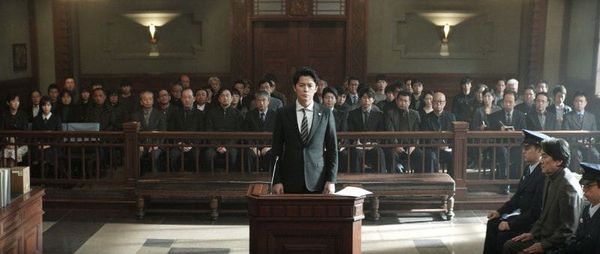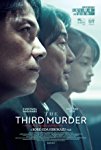Eye For Film >> Movies >> The Third Murder (2017) Film Review
The Third Murder
Reviewed by: Amber Wilkinson

Hirokazu Kore-eda has spent much of his career becoming synonymous with emotionally resonant family-driven dramas, including I Wish, Our Little Sister and Like Father, Like Son. Here he swaps the living room for the courtroom for this noir-inflected tale that leads us deep into the moral maze, before exploring our desire to rationalise even the most terrible crimes. Despite this, the hallmarks of the Japanese director are still here, particularly, father/daughter, mother/daughter dynamics and the relationships that can act as surrogates for them.
The lightness of touch so evident in his family films is no less deft here, as he woos us with the promise of cast iron fact - beginning by showing a murder and the perpetrator - only to spend the rest of the film oiling the ground beneath our beliefs until they can't stop sliding this way and that.

There has, most definitely, been a murder. A factory boss has met his maker and one of his employees, Misumi (Kôji Yakusho) - fresh out of prison after a stint for killing two loan sharks decades before - has confessed to the crime. Lawyer Shigemori (Masaharu Fukuyama) gets assigned to the case because Misumi just can't seem to get his story straight.
"You don't need understanding or empathy to defend a client," Shigemori insists to the young lawyer on his team (marked out in his youthful idealism by the backpack he seems to continually wear - usually reserved for the child members of a Kore-eda cast). Soon, Misumi's understated demeanour and shifting story become a cryptic puzzle Shigemori is desperate to solve. At the same time as he, and by extension, we are trying to get the measure of Misumi on a spectrum that runs from heartless killer through victim to self-sacrificing saint, we are also invited to scrutinise the Japanese legal system. "Victims think they can get away with anything," suggests one lawyer, sourly, in one of many exchanges that shows the system is ready to plough on regardless of whatever facts or emotional quandaries are to hand. The prospect of the death penalty also hangs over proceedings - offering unpleasant certainty in a sea of doubt.
We, meanwhile, are caught in a sort of double judgement, both trying to work out what exactly Misumi's role in the crime was at the same time as attempting to deduce whether Shigemori's own strained relationship with his teenage daughter is influencing the way he views another teenager (Suzu Hirose), who may have a bearing on the case.
Much of the film plays out in dialogues between Shigemori and Misumi, each man on either side of prison glass - their understated performances more gripping than might first appear. This split one-on-one gives Kore-eda scope not just for using the glass as a straight forward reflective surface, but also allowing the men's images to overlay one another - a game he plays with outside the jail walls too, as the tales of fractured family relationships overlap with the conversations between the men. He also makes clever use of mirrored gestures and motifs - snow angels in the shape of a cross or a hand wiping blood from a cheek.
Kore-eda's objective is to show objectivity is almost impossible, and his film offers the allure of ambiguity in a crime cinema universe usually more concerned with absolutes.
Reviewed on: 23 Mar 2018

















